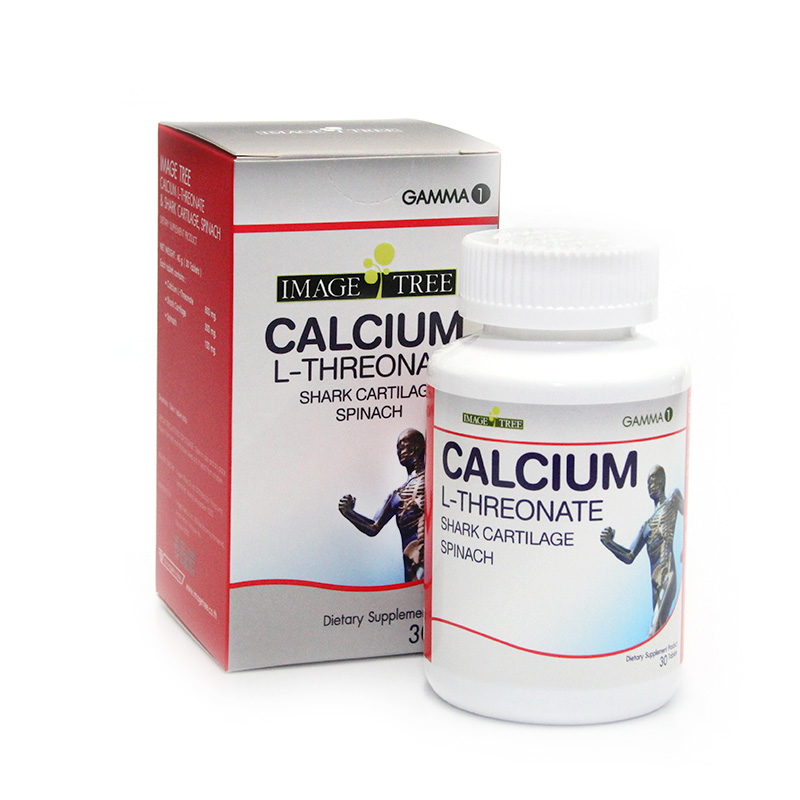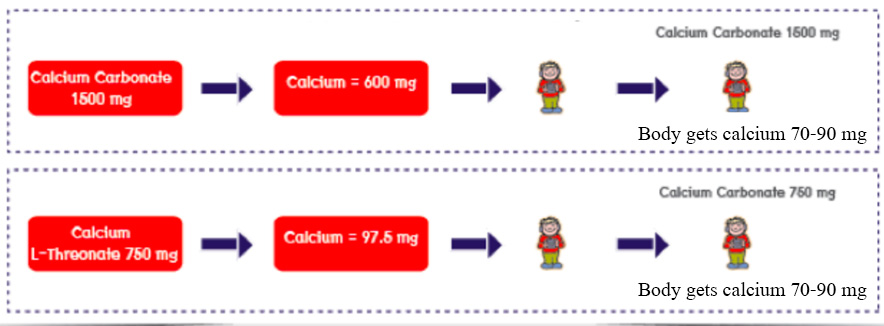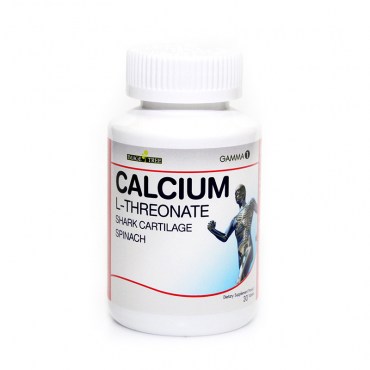
"การป้องกันความเสื่อมถอยของร่างกาย...ดูแลได้ด้วยตัวคุณเอง"
CALCIUM L-THREONATE
Availability: In Stock
• Relieve pain in arthritis
• Increases bone density.
• Maintaining joint functions and promotes bone health
• Reduce Dysmenorrhea
• Don’t cause flatulence
- Supports strong, heavier, denser bones , tendons and joints.
- Increases bone density.
- Maintaining joint functions and promotes bone health
- Don’t cause flatulence
 Image Tree GAMMA1
Image Tree GAMMA1
Calcium L-Threonate
- Calcium L-threonate 800 mg.
- Sharks Cartilage 300 mg.
- Spinach 100 mg.
The mineral calcium is well-known for its key role in bone health. Calcium also helps maintain heart rhythm, muscle function, and more.
Calcium is crucial in growing new bone and maintaining bone strength. Calcium supplements are standard for treating and preventing osteoporosis -- weak and easily broken bones -- and its precursor, osteopenia.
Calcium is used for many other conditions. It's an ingredient in many antacids. Doctors also use calcium to control high levels of magnesium, phosphorus, and potassium in the blood. There's good evidence that calcium can help prevent or control high blood pressure. It also may reduce PMS symptoms as well as play a role in preventing certain cancers. Calcium with vitamin D, for instance, may help protect against breast cancer in premenopausal women. The data, though, are still inconclusive as to whether it might do the same for postmenopausal women. Calcium also has been looked at for other uses, for example, aiding weight loss. But so far, these studies have been inconclusive.
The people at highest risk of a calcium deficiency are postmenopausal women. Since dairy products are one of the most common sources of calcium, people who are lactose intolerant or vegan are also at increased risk of calcium deficiency.
How much calcium should you take?
The Institute of Medicine has set an adequate intake (AI) for calcium. Getting this amount from diet, with or without supplements, may be enough to keep your bones healthy. Doctors may recommend higher doses.
Calcium: Adequate Intake (AI)
| 0-6 months | 210 mg/day |
| 7-12 months | 270 mg/day |
| 1-3 years | 700 mg/day |
| 4-8 years | 1,000 mg/day |
| 9-18 years | 1,300 mg/day |
| 19-50 years | 1,000 mg/day |
| 51 years and up | 1,200 mg/day (women) 1,000 mg/day (men) |
Women who are pregnant or breastfeeding do not need extra calcium beyond the recommendations above.
The tolerable upper intake levels (UL) of a supplement are the highest amount that most people can take safely. For calcium, it's 2,500 mg/day for adults and children over 1 year.
In general, it's best to take calcium supplements with food. For better absorption, don't take more than 500 milligrams at one time. Split up larger doses over the course of the day. For the body to make use of calcium properly, you also need to get enough vitamin D and magnesium.
Calcium L-Threonate is scientifically researched to help enhance bone and cartilage cell functions.
Calcium L-Threonate also helps to maintain joint function and mobility. (** See Ref 1**)
Benefits of L-Threonate
L-Threonate Acid is a key component of the overall formula and is one of the main metabolites of Vitamin C (in vivo).
L-Threonate, a biocarrier for calcium, has specific influence in bone metabolism. It directs calcium passage through the intestine and deposits calcium in bones more efficiently. It also influences the biological activities or functions of Vitamin C and provides optimum supplementation of your dietary collagen and mineral needs.

Benefits of Gamma1
IMAGE TREE CALCIUM L-THREONATE
- Supports strong, heavier, denser bones , tendons and joints.
- Relieve pain in arthritis
- Increases bone density.
- Maintaining joint functions and promotes bone health
- Reduce Dysmenorrhea
- Don’t cause flatulence
 Shark Cartilage
Shark Cartilage
Shark cartilage is Chondroitin. Chondroitin is a substance that occurs naturally in the connective tissues of people and animals. As a supplement in higher doses than is found naturally, chondroitin is a popular treatment for osteoarthritis.
Shark cartilage comes from the skeletons of sharks. Cartilage is a type of smooth, flexible connective tissue that is found in the skeletal systems of many animals, including humans. Unlike mammals, birds, reptiles, amphibians, and most other fish, sharks have skeletons made up entirely of cartilage instead of mostly bones, with smaller amounts of cartilage.
What is chondroitin?
- Chondroitin is a naturally occurring substance formed of sugar chains.
- Chondroitin is believed to help
- the body maintain fluid and flexibility in the joints.
 Spinach
Spinach
This healthy green is full of vitamins, antioxidants and minerals. Spinach has an extremely high nutritional value and is rich in antioxidants and Amino Acid (**See Ref 3**) . It is a good source of vitamins A, B2, C and K, and also contains magnesium, manganese, folate, iron, calcium and potassium.












